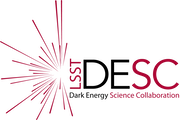The Feb 2025 DESC Virtual Meeting is scheduled for Tuesday, Feb. 18 through Friday, Feb. 21, 2025 with Sprint Day on Monday Feb. 24.
Contacts |
|---|
Scientific Organizing Committee: Alex Kim (co-chair), Tom Glanzman (co-chair), Lucie Baumont, Matthew Becker, Patricia Burchat, Biprateep Dey, Arun Kannawadi (Sprint coordinator), Erwin Lau (Sprint coordinator), Andrina Nicola, Tomomi Sunayama Contact us before or during the meeting via #desc-collab-meeting-hotline |
| Meetings Committee |
Getting Prepared
As you prepare for the upcoming meeting, why not take a look at the pre-meeting checklist and the MAC recommendations and guidelines for meeting accessibility?
Meeting Code of Conduct
As for all DESC meetings, the collaboration’s Professional Conduct Policy is important. Of most immediate relevance are the meeting code of conduct (page 5) and the meeting contact person policy (page 6). As the second policy describes, the Meeting Contact Persons (MCP) are available to meeting participants who are experiencing conflicts or disputes as part of the DESC meeting activities. DESC members who have kindly agreed to serve in this role for this DESC event, and have been confirmed in this role by the Collaboration Council, are the following:
- Céline Combet (slack: combet)
- Aaron Roodman (slack: Aaron Roodman)
- Christos Georgiou (slack: Christos, email: cgeorgiou@ifae.es)
You can reach any of them via Slack to chat or set up a Zoom meeting, or contact them via this anonymous web form (seen only by MCPs).
Goals for February 2025 DESC Meeting
- Summarize Rubin/LSST and DESC progress since last July’s meeting.
- Review today’s ongoing technical/science work within the DESC (Working Groups/Topical Teams/Task Forces).
- Present Rubin/LSST schedule for operation for next year or two, in particular, commissioning, first light and first data releases; build engagement in the DESC community for Early Science.
- Discuss/create specific technical and science goals for DESC for the next year and beyond.
- Prepare for upcoming Spokesperson election.
- Summarize DESC collaboration development (Spokesperson Team/Collaboration Council/Committees).
- Continue to build and foster a sense of engagement and community among DESC members “new” and “old”.
Guiding Principles
- Ensure that we capture opportunities presented by virtual meetings and at the same time recognize and act upon related challenges . For example, introduce sufficient breaks to avoid Zoom fatigue, have focused presentations given the shorter meeting times, and develop innovative solutions for social activities (ice-breakers, social time, coffee rooms, hands-on sessions, “live notes” google docs). The block schedule should be tuned to what works best for a virtual meeting.
- Plenary sessions should be forward-looking and focused on the meeting theme Laying the groundwork: readiness for commissioning, early science, and key science with a coherent, integrated set of topics of interest and value to a large fraction of members , with very DESC-relevant content that many DESC members may otherwise not have easy access to (technically or logistically).
- Given the limited time, give higher priority to science-related talks in plenaries, rather than management and organizational updates (other than the Spokesperson update). Management and organizational updates could be delivered in one-slide summaries, short written reports or, in some cases, integrated in the Spokesperson update.
- Plenaries should allow sufficient time for questions, probably more than for in-person or hybrid meetings, to encourage discussion. Provide a way for audience to post questions before the question period begins.
- Some plenary time should be used to recognize accomplishments and ongoing work across the collaboration in a mode that is efficient and informative.
- Parallel / breakout sessions should complement regular working group (WG) meetings, rather than being redundant with them -- for example, by addressing issues of interest to multiple working groups , or addressing questions that do not even map onto working groups. There should be a preference for a) cross-cutting working group sessions and b) sessions devoted to the newly-formed working groups, especially when such sessions are geared to potential new members. Sessions focused on a single WG topic should be designed to be accessible to motivated DESC members who have not been able to attend regular WG meetings but wish to engage in the topic.
- Prioritize elements that promote a collaborative atmosphere and help build the DESC community. The meeting week should provide opportunities to foster bonding among DESC members.
- Acknowledge that many DESC members are juggling a range of commitments. Consideration should be given to allowing members enough lead time to prepare for and participate in the DESC meeting.



